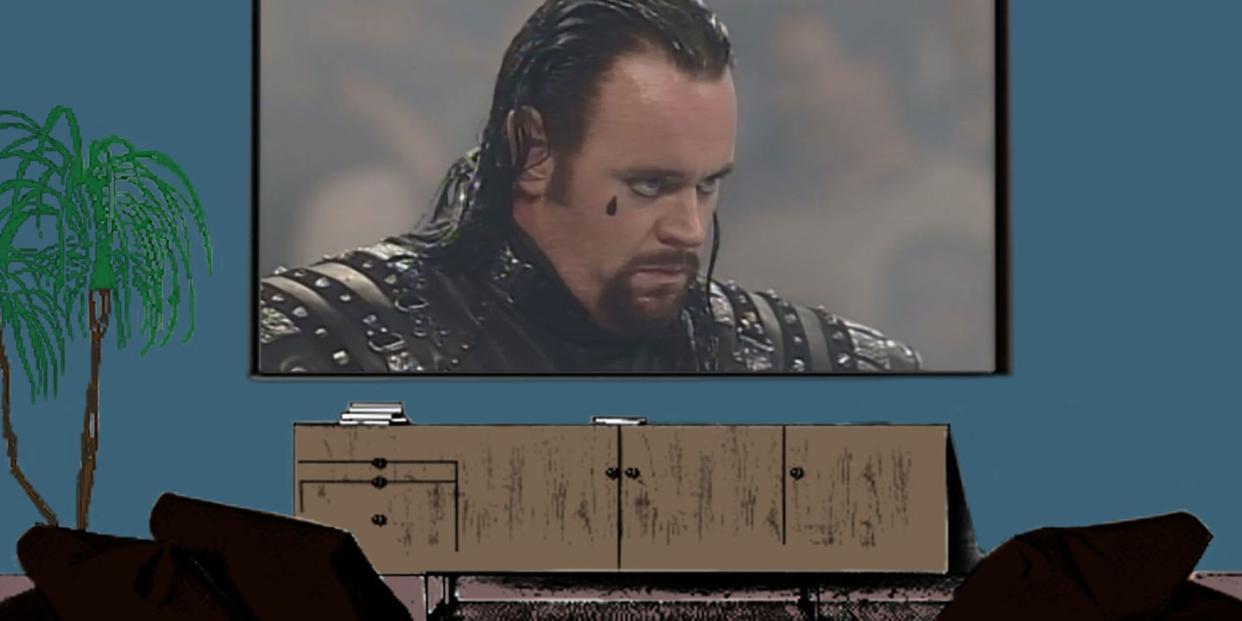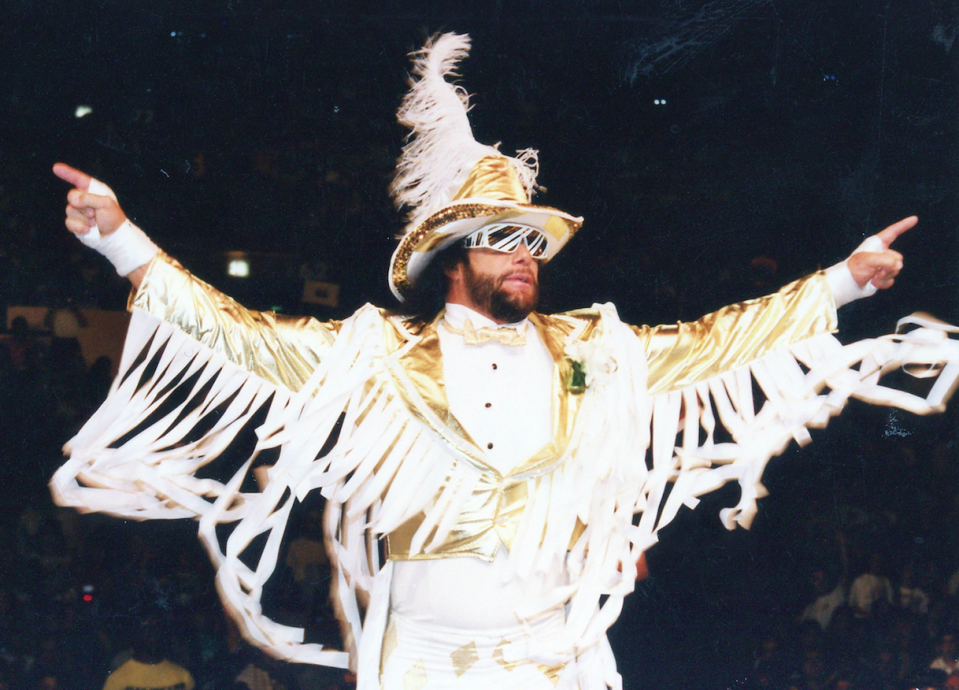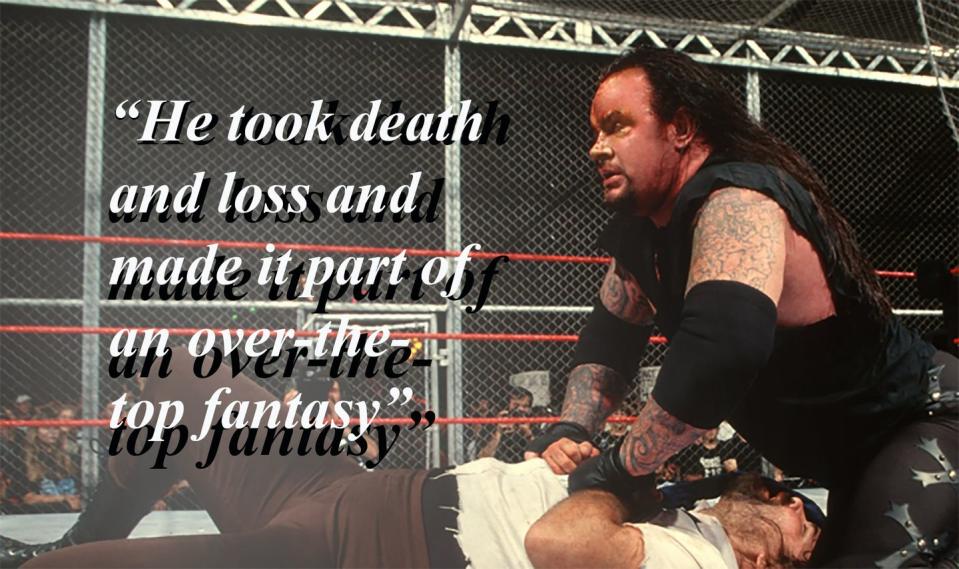My Mental Health: Death, grief and wrestling

As part of Mental Health Awareness Week, Digital Spy staff are sharing their stories of when TV shows and movies spoke to them about their own experiences with mental health problems.
For over 20 years watching WWE has given me an escape that no other form of entertainment can come close to providing.
You may wonder how watching people fight, sometimes with weapons, in cages or even on ladders could help pull a person out of some of their darkest times, but it's always worked for me.
To be a WWE fan means going all-in. It means suspending your disbelief and immersing yourself in the characters, forgetting your own problems and anxieties and fully believing in what you are watching.
In Marvel movies the characters have superpowers, in soaps they're 'regular' people dealing with issues just like you and me.

WWE Superstars are somewhere in between. They're larger than life, meaning they give viewers an escape, but at their core they're presented as real people, who in the end settle their differences in the most primal of manners.
But there's one WWE Superstar who's always been more fantasy than reality, and he's the one who helped me most when I needed it.
I started watching wrestling when I was seven. It was WCW Friday nights on TNT, straight after Cartoon Network went off the air.
My favourite was 'Macho Man' Randy Savage. He wore colourful costumes with tassels, hats and ridiculous glasses. To a kid he was a living cartoon character. I thought he was sensitive, sweet and pure-hearted and every week I wanted him to triumph over the NWO.

I'd seen glimpses of WWE on TV before, but I'd always stuck with being a WCW fan. To me WCW was a bright, happy place with flying cruiserweights and occasional wrestling at the beach!
WWE seemed darker. They had a wrestler named The Undertaker and from what I'd seen of him he was scary and maybe even evil.
But at 10 my life changed overnight when my father passed away.
Suddenly everything was different. I was different. And in the weeks after his death my Friday night viewing changed. Something made me turn to WWE Raw to get my wrestling fix, and there was The Undertaker.

Death has always played a massive part in The Undertaker's character. Actually it kind of is his character.
The Undertaker's legend is that he was actually meant to be dead. He'd been buried alive and locked in caskets, and his manager "Paul Bearer" carried an urn to the ring with mystical powers.
He dressed all in black, had long dark hair, was covered in tattoos of skulls and didn't talk much. He was the opposite of the Macho Man. His ring entrance was like a funeral procession, complete with druids and sometimes even a coffin.
When I found him he was feuding with his 'brother' Kane, who he thought had died in the same fire that killed their parents.

While a soap opera, TV show or movie may have contained a storyline I could relate to, The Undertaker gave me something better. He took death and loss and made it part of an over-the-top fantasy.
When the impact of death was inescapable in my own life, when it had changed everything for me and my family and when grief felt like a dark cloud hanging over me, The Undertaker – ironically – brought me light. I'd seen coffins, funerals and grief in real life, but on WWE it was part of the pageantry.
It wasn't sad or scary, it was so over-the-top that I could immerse myself in this character and his acknowledgement of death, while getting relief from my feelings of grief.
While in school I felt like someone people were tiptoeing around, scared that I might break if they mentioned anything connected with death or loss, The Undertaker was acknowledging it every week.
And rather than making me upset or morbid, or bringing up bad memories, he was allowing me to escape into his world where nothing was too dark to overcome.

Twenty years on and The Undertaker still hasn't gone from the WWE. And neither have I.
Part of me wants him to retire, but I know every year at Wrestlemania the lights will go out, smoke will fill the arena and I'll feel like a child again.
French philosopher Roland Barthes once described wrestling as 'the spectacle of excess', noting that it's extreme portrayals of themes were akin to the dramas of Ancient Greece, with 'a light without shadow' generating 'an emotion without reserve.'
I agree. WWE is over-the-top, excessive and epic.
But when I needed to process something very real, when I was very young, it presented it to me in the most fantastical way possible, which helped me let go of fear and, if only for a while, escape the darkness.
Even now, nothing works like WWE.
Don't bother trying to talk to me when I'm watching Raw, Smackdown or a pay-per-view because for those hours I am all-in, immersed in a world were heroes wear tights, enter the arena to music and perform bodyslams – and nothing else matters.
Here are the other articles in our week-long series:
To know what a panic attack feels like, watch Ravenous
How horror movies helped me process grief
What The Sopranos taught me about mental illness
For Colored Girls expresses ten kinds of pain
Fleabag's bravado hides a grief that struck at my soul
How EastEnders' Lee Carter story gave me comfort
Mental Health Awareness Week 2018 is 14-20 May, hosted by the Mental Awareness Foundation, with this year's theme of 'Stress'. https://www.mentalhealth.org.uk/campaigns/mental-health-awareness-week
If you identify with any of the stories in our My Mental Health series, you may need to talk to someone. Other organisations who can offer support include Samaritans on 116 123 (www.samaritans.org), and Mind on 0300 123 3393 (www.mind.org.uk). CALM (Campaign Against Living Miserably) also has helplines available from 5pm to midnight, 365 days a year, on 0800 58 58 58 (nationwide) and 0808 802 58 58 (London) (www.thecalmzone.net/).
You Might Also Like

 Yahoo News
Yahoo News 
